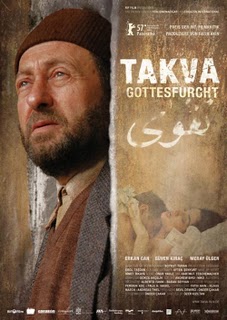
TAKVA
Turkey, 2006, 96 minutes, Colour.
Erkan Can.
Directed by Ozer Kiziltan.
Takva is set in Istanbul. It focuses on a man who lives quite a solitary life, faithful in a very literal way to the injunctions of the Koran. He was worked for the same company for thirty years. We see the plain daily routines of his life. An imam decides that he is just the person to do collections from debtors for the welfare of the mosque and the religious order and trainees there. This means an enormous transformation in his life, the loss of the regularity of his routine and a challenge to his beliefs.
Decked out in a better suit and given the use of a car and driver, along with advice from the business manager, he is flattered and conscientious. But his new tasks expose him to a world he is not familiar with at all: poor families, afternoon alcoholics, wheelers and dealers who offer bribes. His immediate reaction is stern, according to the letter of the book. In the meantime, he is constantly troubled by the sexual nature of his dreams – in real life, he is socially awkward with women. What is he to do? He frequently wonders whether he is losing his mind.
The director declares that he is an atheist but is interested in the problems of what he calls ‘ancient ideologies’. Can someone live according to the precepts of a 7th century religious life in the contemporary globalised world. How can one be holy? Is compromise the answer or is a descent into madness? Tavka presents this dilemma with great force and challenge.
1. An impressive film? For worldwide audiences? Impact for Muslim audiences, strict Muslims? Non-Muslims? Issues of religion? The critique of religion? The perspective of the atheist director? His suggesting people interpret according to their beliefs?
2. The background of Muslim traditions, the reading of the Koran, orthodox interpretation of principles and practice, strictness, applications, literal?
3. Muslim leadership, the sheikhs and their assistants, the office-bearers, the seminary and education, seminary life, the students, the order? Routines, prayer, rituals – especially the ecstatic prayer? Listening to the readings?
4. The clash of beliefs with the complexities of the modern financial, globalised world? Deals and compromise? People and responsibility? The sheikh and his teachings about forgiveness? For example the alcoholic workman?
5. The issue whether old beliefs and religions can interpret the contemporary world? The strictness and judging people or compromising? The purity of life or double standards? The impossibility of living up to ideals – or losing one’s mind? The hero and his losing his mind – a moment of transcendent holiness or of madness?
6. The character of Muharrem: his age, life experience, strict interpretation, not married, no women in his life, socially awkward? Thirty years at his job, with Mr Ali? Routine, reliable? Ali and the orders, the mosque and prayer? His getting the new job, the respect, his being chosen? His acceptance? His explanation of his background, life, the different work? His having to collect rents for the order, going out into the world, discovering it? The alcoholic? The poor family? The bribes for favours from the mayor? His personal life, the importance of his dreams, the range of sexual temptations, his reaction, cleansing himself, asking God’s forgiveness? The new clothes, the new style, people’s respect, the car at his disposal, the driver? Meeting people, the people’s reaction, liking him, phoning him (and Ali remarking that he was taking his phone calls)? His ordinary life at home, simplicity? Going to the mosque, the prayer, asking Raoul for advice? Raoul as his immediate boss, for the rents, the financial explanations? Raoul’s advice, especially when the sheikh went on the forty-day retreat? The sheikh and his respect? The worldly advice given to Muharrem?
7. The sketch of Mr Raoul, his role in the order, the business manager, worldly-wide, his advice? The sheikh also being worldly-wise, yet wanting the purity of the order, not contaminated with money? The sheikh and his retreat, the prayer sessions, his admiration for Muharrem?
8. Mr Ali, the job, worldly, the clients, buying the sacks? The builders and constructors – and their bribes?
9. The young man from Kosovo, employed, Muharrem being strict on him, making him get a haircut? Being harsh with him? Giving him orders? His getting the tea? His standing up to Muharrem? The memories of Kosovo, his suffering, his family?
10. Muharrem and his becoming authoritarian, vain – yet the temptations? The young woman – following her, discovering that it was the sheikh’s daughter? The sheikh’s suggestion that he get married, Mr Raoul’s? agreement, the availability of the daughter?
11. The effect of people on Muharrem, the alcoholic, wanting him sacked? The poor people who couldn’t pay their rent? His dealing with the constructors, the money, trying to invest it properly, the extra money, the decision of what to do with it? Caught in corruption – and trying to get out of it?
12. His comment that he would lose his mind? The pressure of the job, the pressure of interpreting the Koran according to strict principles? His getting physically worse, emotionally worse? His collapse, in the mosque, his madness? His being taken to bed, the people caring for him – and the sheikh’s daughter (did the marriage take place)?
13. The challenge to believers and non-believers about their principles, applications, standards of living, authenticity, integrity?